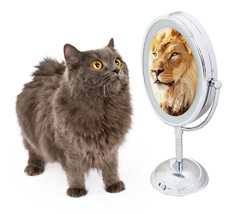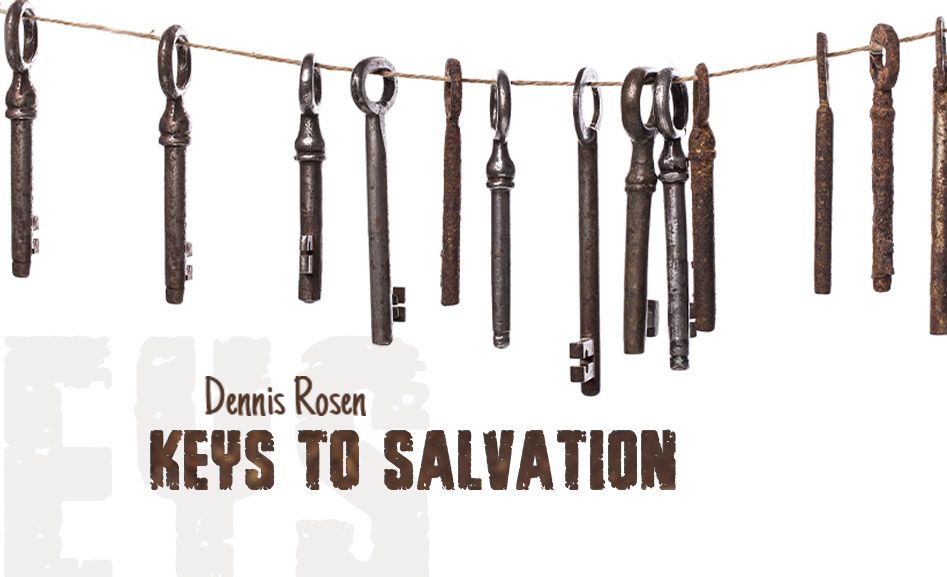
What is Your Self Worth?
The main thing that we all suffer from is nagging doubts about our self-worth: “Do people like me?” “Am I competent at what I do?” “What have I accomplished with my life?”...

When a baby feels hungry, he thinks about food and the hunger goes away. If he’s cold he wishes for warmth and problem solved. If it’s a bit too noisy in the room, he lets out a cry and that’s that – instant silence…
It’s what psychologists call primary process thinking or magical thinking. The child “omnipotently” wishes for something and thinks that he causes the result. Mommy didn’t do it; he did it through his “all-powerful” thinking. To the infant, mommy hardly exists at all as a separate person – she is still undifferentiated since “mommy and I are one”.
How do we know that the baby thinks this way? Did a baby ever tell a researcher about his fantasies of grandiosity? The question always bothered me. But these days, I have more than science to answer my questions. Keep reading and the next time that you look at your baby not only will you understand “how he thinks” but you’ll understand the fundamental problem of our lives.
The main thing that we all suffer from is nagging doubts about our self-worth: “Do people like me?” “Am I competent at what I do?” “What have I accomplished with my life?” From doubts about our parenting abilities, to doubts about how to use our time best, to doubts about our faith, to doubts about our doubts!!  We humans are so obviously using so much of our time trying to prove ourselves to ourselves and to others in some way.
We humans are so obviously using so much of our time trying to prove ourselves to ourselves and to others in some way.
The first question is why do we do this? Why do we need to assert our self-worth and prove our self-worth? Don’t we know that we have intrinsic worth by virtue of the fact that G-d created us and we exist?
The second question is related to the first. Since almost everyone is trying to prove their worth, in some way, the question is how are they attempting to do this? How are people attempting to master their feelings of existential inadequacy?
According to Rabbi Shalom Arush, the prevalent problem of our culture is narcissism and arrogance. We, especially, are a generation which prides itself on “The power is in my hands…”; “I am the master of my fate”; “I am the captain of my ship”; and “the power of positive thinking” (mine, of course) – these and similar expressions show how we moderns think. We like to take credit for any good fortune that comes our way. I’m not sure if it’s still in print, but there actually was a magazine that “modestly” captured the theme of our generation, it was called “SELF” magazine – it’s all about “ME”! Which are what interests people most – THEMSELVES.
It shouldn’t surprise us to know that there is also a psychotherapy by the same name. It’s called “self-psychology”. It’s not hard to see what Rabbi Arush is talking about when he says that our lives are really battle against our outdated arrogant, magical, omnipotent fantasies that we are G-d. This then answers question number two: we try to prove our worth through arrogance, narcissism and the massive denial that we are creations and not the Creator.
But don’t we have to build ourselves and give our children a strong sense of self as a foundation for a healthy life? Is the world really ready for “self-less psychology”?
Rabbi Dr. Mendel Kessin from Lakewood has an original answer for these questions which actually proves hashkafically (according to the Torah) that Rabbi Arush is right – that the central human conflict is the choice between arrogance and emuna.
The first question is more difficult to answer than the second one. The first question was why is everyone trying to prove themselves and outdo the next guy?
Rabbi Doctor Kessin says that before we were born, our souls were in Heaven. Up in Heaven our souls actually didn’t have to do anything or take any action in order to feel “self-worth”. In Heaven the soul only needs to think and not do anything. This is because in Heaven, we were intimately connected to our Creator though a spirit that was free from a body. Our souls simply basked in the blissful radiance of the Creator’s glorious essence. But that bliss came to an end when the soul was severed from the Creator in order enter a body. When that happened, our souls felt a painful loss of “self” as a result of being severed from its Source.
Once our souls “landed” in this world, as babies, we were immediately confronted with the problem of how to return to the sense of completeness and perfected “self-worth” that we felt when we were unencumbered by bodies and were very close to the Creator Himself. Before the baby learns about the necessity for action in this world it still tries to use thought to get what it needs. Only in this world of action, the infant’s thoughts and wishes don’t have the power that they once had when he was a soul not in a body.
Hashem allows the baby a transitional period of believing that he is getting his own needs met by the power of his own thoughts but not for long. His emuna in himself and in mother (a necessary developmental stage) comes to an end when he realizes that both he and mother are not able to have their needs met by thought alone. This causes the developing child to feel a sense of having been injured. Due to the loss of his former lofty status, as a soul not in a body, he now feels a sense of inferiority which he tries to repair by proving his self-worth to himself and others.
Without training in emuna, the child grows into an adult whose whole life is dominated by gnawing anxieties about his actual worth. The narcissism and arrogance of our generation is an expression of our attempt to restore our fall from Divine grace through denial about what happened to us – namely that we once had a complete and perfect sense of self in relation to Hashem and we subsequently lost it when we came into our bodies.
This answers the first of the two questions which is: Why do we need to assert and prove our self-worth? And the answer is because of the tremendous loss of self that we experienced when we came into our bodies. The second question raised by Rabbi Kessin is how we attempt to “fix” the problem of our injured “self-worth.” And he answers as Rabbi Arush has, that it is through a massive denial of our Divine origins and our subsequent attempt to attain “self-worth” by taking credit for whatever we accomplish.
There is a third question which is how we can we return to the sense of completeness that we lost. Obviously when the “self” gets caught up in thinking that it is responsible for all of its achievements it can only “enjoy”, at best, the temporary illusion that the self is whole and complete. Obviously this won’t amount to any real or lasting self-esteem based upon Truth. The only way for our souls to feel truly happy and worthy again is to stop pursuing self-worth – that is self-worth that doesn’t recognize that the source of self-worth comes from the Creator. The creator has given each of us certain abilities and talents which he wants us to respect and be grateful to Him for, but not to think that we have made ourselves great through our own independent efforts. The Creator does not want us to ever feel inferior, but He does want us to acknowledge that whatever we have is from Him.
The central human conflict is whether to believe in ein ode milvado (there is really nothing except Hashem) or yesh ode milvado (there is also ME and I am a reality on my own, separate from Hashem, G-d forbid). Rabbi Kessin asks how it is that a tzaddikim who attribute none of their achievements to themselves, shun material possessions and give their money to others don’t feel inferior and lacking.
The answer is right out of Rabbi Arush’s books: the tzaddikim have a rock solid sense of self with no inferiority because they believe in ain ode milvado. Their emuna that Hashem is everything “enables” Hashem to heal the split and re-connect with them again as though they were in Heaven.
Our success too, depends on reversing the arrogant drive for self-worth that is separate from Hashem by developing the humility to know that everything depends on Him. As Rabbi Arush so beautifully implies in his book, The Garden of Knowledge, humility is not just a trait like, for example kindness or boldness. Humility is much more than a personality trait. It is a level by itself. Humility is the foundational level that we humans must reach to abolish self-idolatry and reach completeness and fulfillment in this lifetime.









Tell us what you think!
Thank you for your comment!
It will be published after approval by the Editor.